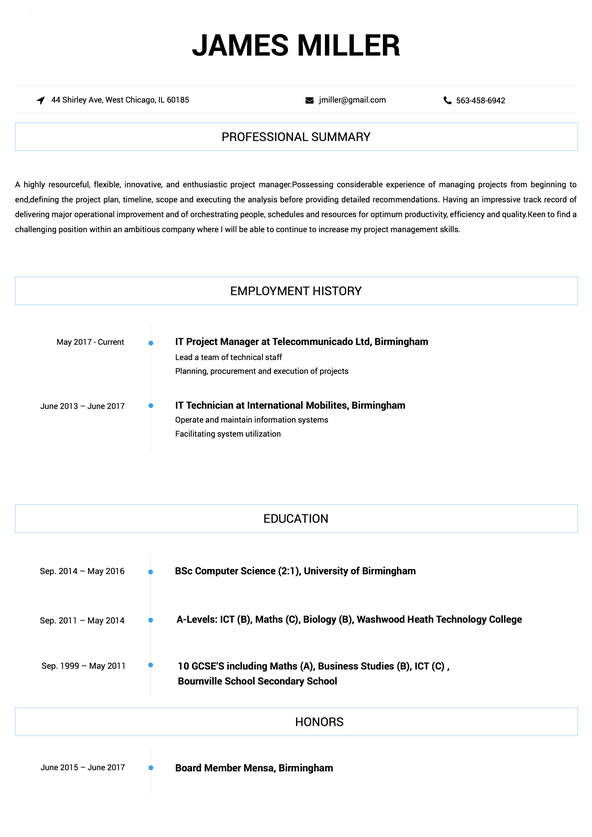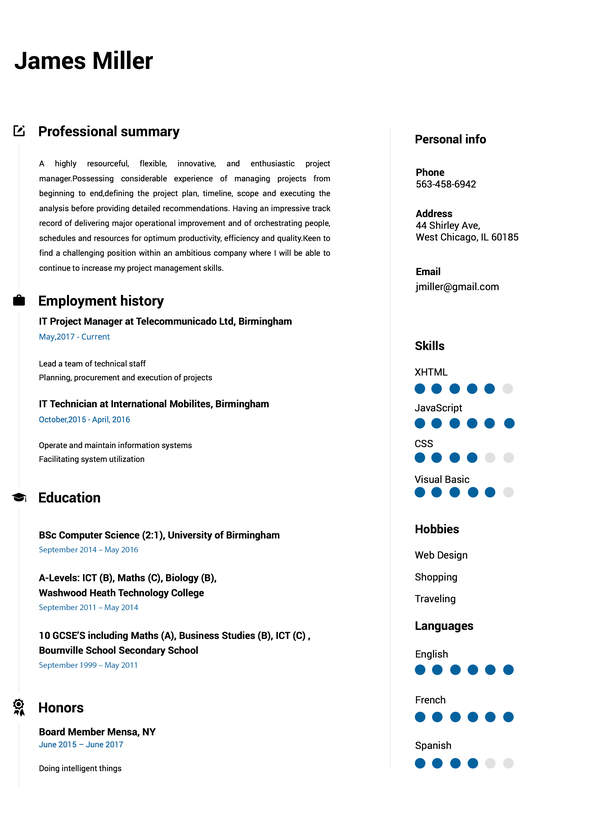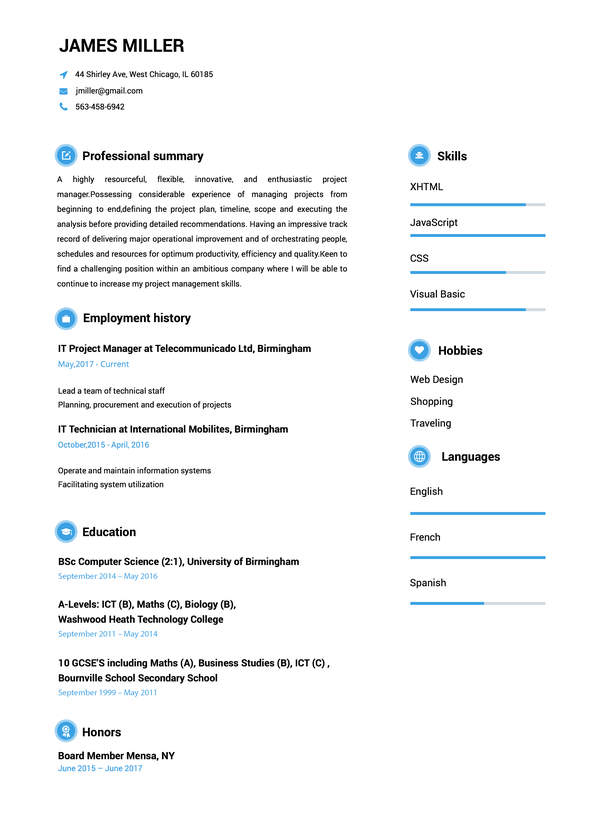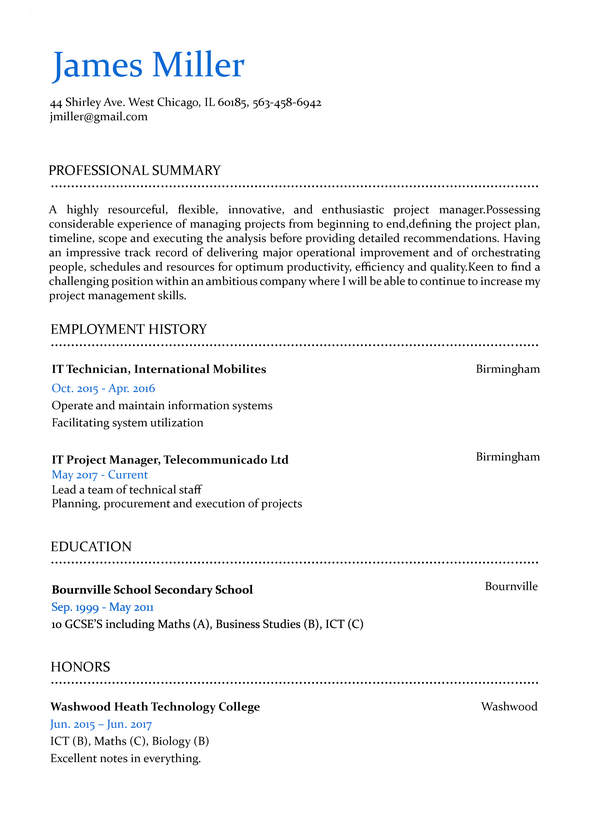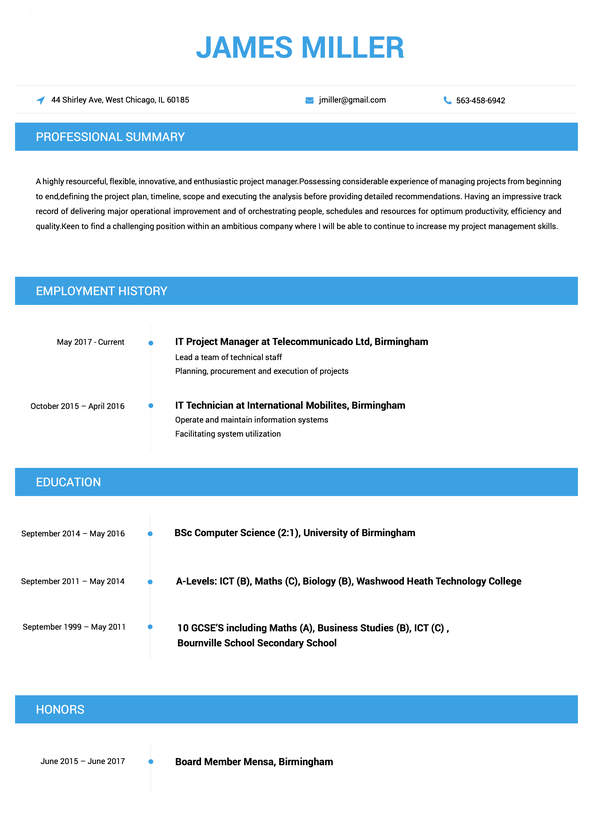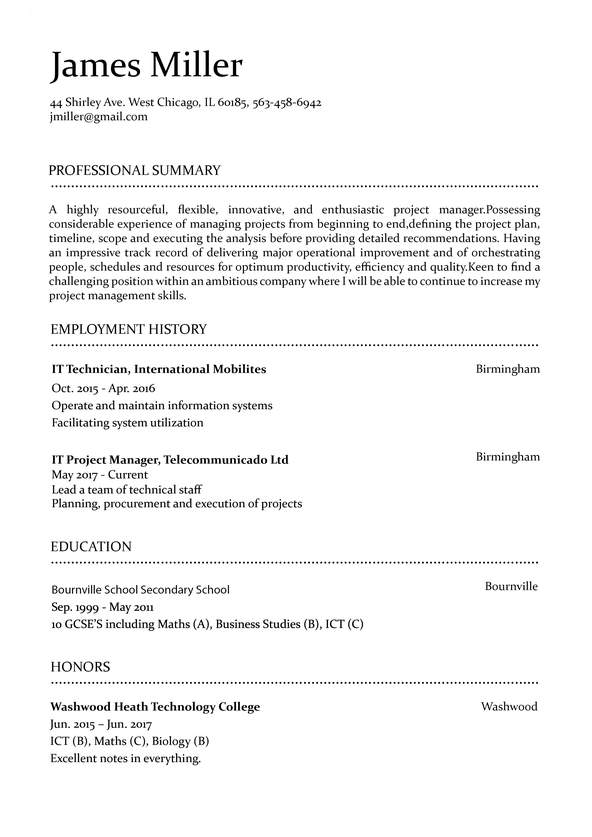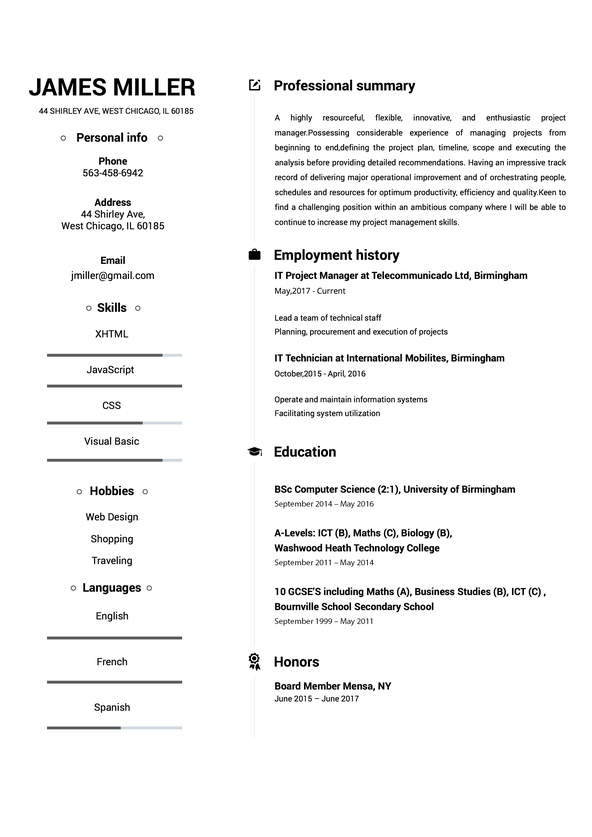 Use This Template
Use This Template 
Build your resume in 15 minutes
Create an awesome resume that meets the expectations of potential employers with our selection of professional, field-tested resume templates.
journalist: Resume Samples & Writing Guide
Employment history
- Taking photographs or videos to accompany stories
- Working with editors to ensure accuracy and quality of content
- Developing story ideas and researching topics
- Monitoring news sources for story ideas
- Attending events and press conferences
- Working with editors to ensure accuracy and quality of content
- Collaborating with other journalists
- Working with editors to ensure accuracy and quality of content
- Writing news stories, features, and other content for publication
Education
Skills
Do you already have a resume? Use our PDF converter and edit your resume.
Professional Summary
Employment history
- Collaborating with other journalists
- Developing relationships with sources
- Editing and proofreading stories
- Conducting interviews with sources
- Collaborating with other journalists
- Fact-checking stories
- Editing and proofreading stories
- Developing story ideas and researching topics
- Monitoring news sources for story ideas
Education
Skills
Employment history
- Keeping abreast of current news and events
- Editing and proofreading stories
- Utilizing social media to promote stories
- Working with multimedia software to create content
- Developing story ideas and researching topics
- Editing and proofreading stories
- Utilizing social media to promote stories
- Developing relationships with sources
- Working with multimedia software to create content
Education
Skills
Employment history
- Monitoring news sources for story ideas
- Utilizing social media to promote stories
- Editing and proofreading stories
- Monitoring news sources for story ideas
- Editing and proofreading stories
- Working with multimedia software to create content
- Working with editors to ensure accuracy and quality of content
- Conducting interviews with sources
- Fact-checking stories
Education
Skills
Employment history
- Editing and proofreading stories
- Conducting interviews with sources
- Working with editors to ensure accuracy and quality of content
- Keeping abreast of current news and events
- Collaborating with other journalists
- Writing news stories, features, and other content for publication
- Fact-checking stories
- Collaborating with other journalists
- Monitoring news sources for story ideas
Education
Skills
Not in love with this template? Browse our full library of resume templates
Job-hunting in the world of journalism is like working as a journalist…
It can be fast-paced and brutal.
As opposed to a large industry such as retail or foodservice, there aren’t nearly as many journalist positions across the U.S.
According to the U.S. Bureau of Labor Statistics (BLS), the journalism industry, which includes reporters, correspondents, photojournalists, and editors to name a few careers, will decline by 12% from 2018 to 2028.
Not to mention, there are only 37,140 reported jobs throughout the industry in the U.S. as of the latest 2018 statistics, to begin with.
Whether you’re looking for a part-time freelance journalist, full-time reporter position, or something else altogether, you’re going to have your work cut out for you to stand out in a sea of aspiring journalists.
Luckily, no matter where you’re at in your career, this guide will help show you what you need to know to craft a knock-out resume that’s both memorable and compelling.
And, most importantly– gets you the interview.
What this guide will cover
In this guide, you’ll learn how to craft an effective, compelling journalist resume from beginning to end, as well as some tricks to help you stand out from the crowd.
You’ll learn:
- How to format your resume to help your strong points to stand out and make your resume more convincing
- Ways to make your skills more prominent so you’re immediately put into another class above other applicants
- How to put together a journalist resume even if you don’t have much (or any) experience
- Plus, resume templates that will take your resume to a whole new level, without any added expertise necessary
- And much more
Speaking of knock-out resume templates crafted by experts, don’t have the time or energy to spend hours fiddling with your resume design?
Check out Resumebuild’s full library of resume template examples here. In just 5 minutes, you could grab one of our ready-made templates, drop in your information, and have an expertly-crafted resume design ready to delight recruiters.
How to write a journalist resume that tells a compelling story (and gets your phone ringing)
Think of your resume as a good story.
You want to report the facts about your experience, just like a good story adheres unrelentingly to the truth.
But you also want to be emotionally compelling.
In the same way that you’re used to moving a reader emotionally, whether it’s a column or report about an unknown but fascinating story from a small-town neighborhood or just a simple sports report, you want to captivate and leave a lasting impression.
You need to identify what you want the recruiter to feel as they read through your resume and place the information into your resume to create the desired emotional response.
For example, a good journalist resume:
- Captivates: A good resume is formatted in a way that holds the attention of the recruiter and directs it where you want it to go.
- Surprises: The content of your resume should impress in a way that most resumes fall short.
- And comforts: The recruiter should feel good about having read your resume.
Through each of the sections below, you’ll learn how the various different parts of your resume can be written and formatted to create these feelings– and get you noticed in all the right ways.
1. How to captivate recruiters with the right resume formatting
How should you format your resume?
What should show up first?
And how do you keep recruiters from throwing your resume into the digital trash bin?
Before putting words down on the page, it’s important to invest some time in learning how to effectively format your resume first.
Why is this important?
Let’s look at some examples to better understand why.
Use chronological structure (unless you have very little industry experience)
First, it’s generally best to use a typical chronological order for your journalist resume.
Such as:
- Profile (objective or summary)
- Experience
- Education
- Certifications
- Skills
- Other details
But if you’re low on experience and you have a good list of relevant skills from outside the journalism industry, you could start with skills before experience.
How does that change things?
If you have little to no experience, your resume will look pretty bare.
Like this:
WRONG
[OBJECTIVE]
EXPERIENCE:
JOURNALIST / NOV 2019 - PRESENT
Elantris, Omaha, NE
- Created news stories on breaking events
- Collaborated with field reporters and other writers
- Occasionally contributed to feature stories planning
EDUCATION:
Internship in Investigative Journalism / The Eagle
2018
Bachelor of Arts in Journalism / California State University, Fullerton
2018
There are a few problems with that example, but the most important one is this - it looks really sparse.
Presumably, there would be a nice ‘Skills’ and maybe additional details section after that.
But that won’t help things much when the first thing the recruiter lands on after your profile is an empty experience section without much to see.
It’s going to turn them off within 3 seconds and they’ll be gone for good.
Opportunity lost.
Moving your skills section to the top of your resume to make up for little or no experience
Instead, if you shifted your skills section to the top, just below your profile, and gathered every relevant skill you could mention - you’d flip that initial impression on its head.
For example:
RIGHT
[OBJECTIVE]
SKILLS:
- BA in Journalism
- Never missed a deadline
- Investigative journalism experience
- Works hard to protect sensitive sources and commit
- Excellent reporting skills and adherence to quality sources
- Strong experience with digital tools and programs such as Slickwrite, Buzzsumo, Hemingway, Echosec, Photoshop, and InDesign
EXPERIENCE:
JOURNALIST / NOV 2019 - PRESENT
Elantris, Omaha, NE
- Created news stories on breaking events
- Collaborated with field reporters and other writers
- Occasionally contributed to feature stories planning
EDUCATION:
Internship in Investigative Journalism / The Eagle
2018
Bachelor of Arts in Journalism / California State University, Fullerton
2018
A small change that makes a big difference in the way your resume is interpreted (with exactly the same information).
Especially if you don’t have much experience.
The industry is constantly changing, most notably because of new technology. Plus, journalists need to be multi-faceted.
So, keep in mind that you can get some bonus points if you have more recent tech-related or other unique skills you can mention, which you might have picked up from outside the industry.
And, more importantly, that might be something that even experienced journalists do not have.
Your experience section will still be sparse (though there are other things you can do there to spruce it up– more on that later).
However, by the time the recruiter gets to it, they’ll have read your knockout summary or objective and seen your impressive skills list, so the context will be vastly different.
The same can be done with your education.
If your education section is more impressive, then you can make that more prominent.
It’s not advised to put your education above your experience as that looks awkward.
However, you can mention your degree(s) and any additional courses prominently in your profile and skills section to balance out for not having much experience.
Notice what I put at the top of the skills section in the previous example:
RIGHT
- BA in Journalism
- Never missed a deadline
- Investigative journalism experience
- Works hard to protect sensitive sources and commit
- Excellent reporting skills and adherence to quality sources
- Strong experience with digital tools and programs such as Slickwrite, Buzzsumo, Hemingway, Echosec, Photoshop, and InDesign
It might sound odd to mention that in your skills section, but there are really no rules here.
Mentioning your BA in Journalism communicates that you have a certain collection of skills which you learned in the acquisition of your degree, so it’s perfectly fine to list it in this way.
However, only do this if you’re moving your skills section above your education, otherwise remove it.
Help your best points stand out
In addition to restructuring your sections to help your best points stand out, another last but just as important point is knowing how to restructure the words, phrases, and styling to do the same.
Take our example above.
Notice how I made the top two items in my skills list bold:
RIGHT
- BA in Journalism
- Never missed a deadline
- Investigative journalism experience
- ...
By selecting my two most impressive skills, placing them at the top of the list, and listing them in bold, they stand out like a sore thumb.
Think of all this as restructuring your text in a way that guides the recruiter reading your resume to the information you want them to notice.
Without any bold, caps, or italics (anything you can use to play with the text) within your resume, it just looks like a big block of text.
If that’s the case, you can’t control where the recruiter looks.
They’ll glance around until their eyes catch something. It might be good… but it might not.
Let’s look at one more example.
Say you actually have quite a bit of experience in various roles.
If you structured your experience section like this, you wouldn’t be doing yourself any favors:
WRONG
EXPERIENCE:
The Lusitania Times / Miami, FL
Editor / OCT 2017 - PRESENT
- Managed a team of 15 writers
- Collaborated with field reporters, photographers and various sources to produce high-quality stories
- Occasionally contributed to an editorial column on the current political climate
Waking Up / Miami, FL
Senior Reporter / MAR 2015 - AUG 2017
- Worked as an interim editor to revise, check, and edit news stories written to maintain the publication’s high content standards.
- Published a weekly blog about about local and regional politics and other relevant current events
- Supervised as many as 8 newsroom interns throughout my tenure, guiding new writers to learn the ropes and becoming integrated into the culture
The Morning Stir / Tampa, FL
Journalist, JUNE 2016 - JUNE 2017
- Created news stories on various topics relevant to the local community and current events
- Collaborated with newsroom reporters and other team members to publish stories
- Never missed a deadline
Why is that? “It just looks like a plain-old experience section on a resume,” you might say.
That’s true, but plain isn’t what we’re going for.
Instead, restructure the information like this:
RIGHT
EXPERIENCE:
EDITOR / OCT 2017 - PRESENT
The Lusitania Times / Miami, FL
- Managed a team of 15 writers
- Collaborated with field reporters, photographers and various sources to produce high-quality stories
- Occasionally contributed to an editorial column on the current political climate
SENIOR REPORTER / MAR 2015 - AUG 2017
Waking Up, Miami, FL
- Worked as an interim editor to revise, check, and edit news stories written to maintain the publication’s high content standards.
- Published a weekly blog about about local and regional politics and other relevant current events
- Supervised as many as 8 newsroom interns throughout my tenure, guiding new writers to learn the ropes and becoming integrated into the culture
JOURNALIST / JUNE 2016 - JUNE 2017
The Morning Stir, Tampa, FL
- Created news stories on various topics relevant to the local community and current events
- Collaborated with newsroom reporters and other team members to publish stories
- Never missed a deadline
Again, small change but a big difference in how the recruiter is going to interact with your resume.
In the first example, they’ll peruse your experience section, likely noticing your various employers, most of which they’re not likely to be familiar with.
In the second example, your experience in various different journalism-related roles will immediately jump out at them and make a great impression.
Keep in mind, though, that if you do have an impressive employer to cite, consider bolding their name so it will also be impossible to miss.
2. How to give recruiters what they’re looking for
Have you ever thought about what recruiters are thinking as they read through your resume?
I hope so, because it’s arguably the single most important thing you can do to craft an effective resume.
Before we get started breaking down each area of your resume, it’s important you do something first:
Look back at that job post and look for the phrase, “ideal candidate” (or something like it).
Go ahead, I’ll wait.
Got it?
Chances are, on each job post, the recruiter mentioned something like, “What we’re looking for in the ideal candidate is…” (Or: “Requirements”, “This job is perfect for…”)
Everything mentioned after that phrase is gold that you can and should capitalize on fully.
Sure, it’s a good idea to have a standard resume that’s well-balanced and generally shows your strongest points for whenever you need it / don’t have time to personalize.
However, to really get the job, you want to write to the job post.
Or, in other words, you want to try and speak directly to that recruiter and say, “I’ve got what you’re looking for.”
For example, this was taken straight from a recent job posting for a full-time journalist of a new local digital outlet:
“Requirements:
- Bachelor’s degree in Journalism, Communications, English or relevant field
- Minimum of 1 year working experience as a journalist or reporter
- Capable of maintaining an ethical and objective standard in reporting
- Ability to meet deadlines and accurately fact-check information
- Excellent observation and judgment skills
- Superb communication and networking skills, along with an aptitude to effectively extract information”
Some of that is basic, sure, but there are also some gems there as well.
For example, if you have a proven track record meeting deadlines, like they mention wanting, you could highlight this in one of your lines of experience:
RIGHT
- Maintained a perfect track record meeting deadlines for publication
You could even take this a step further and mention something about your ability to meet consistent deadlines in your summary.
Keep in mind that this is just one example.
Make a list of all the things mentioned in the job post which you have to showcase, then list the ways you can display those qualities/skills more prominently.
Also, consider what those qualities are which you see recurring throughout most job posts.
Keep these qualities in mind as we work through each section of your resume so you can work them in the best way possible (often more than once).
3. How to write a resume objective or summary that hooks recruiters (with examples)
Every story has an attention-grabbing headline or featured image meant to draw the reader in.
If we continue the narrative from earlier, your resume profile is exactly that.
Your name and basic information is just as easily forgotten. It’s your profile– whether that’s an objective or summary, which is meant to hook and draw them in to read the rest of your resume.
Your profile is a unique place too, because it’s the only place on your resume where you can show off a bit of your writing chops, if that fits your journalistic style.
That’s especially useful if you don’t have much experience, as you get the chance to impress them with your prose before they get to your possibly barren experience section (though more on how we can help even that later).
Before we dive in, a resume profile comes typically in one of two forms:
- Resume summary: This is a summary of your career highlights: accomplishments, notable employment, awards, and education. Good for when you have tons of experience and accomplishments to fall back on.
- Resume objective: This is where you lean more on expressing your ambition, interest, and even passion for journalism and obtaining a position with said company. Good for when you lack experience.
Choosing which to use is pretty straightforward.
If you have enough experience and accomplishments to make a compelling 2-4 sentence paragraph, go with a resume summary.
If not, and you need to lean more on skills and expressing your desire to obtain a position with the company, go with a resume objective.
Truth be told, there isn’t a world of difference between the two.
However, the difference is important in terms of how you want or need recruiters to feel after reading your profile.
Let’s look at some examples.
Resume summary examples that let your experience shine
Let’s say you have a good number of years under your belt and maybe even an accolade to your name.
You’ve decided a resume summary is best for you.
Generally, the format is simply 3-4 well-written sentences detailing your most notable:
- Experience
- Awards
- And/or results/skills
However you want to mix all that up is your choice, just make sure you’re summarizing your strongest points and, as we talked about earlier, doing it based on what the recruiter says they’re looking for.
Side note: You don’t need to rework your summary for every job post. You can just write it based on what most employers say they’re looking for.
However, taking a few minutes to personalize your summary based on a job post can often give you an edge that’s invaluable to getting the interview.
With that said, let’s look at an example:
WRONG:
A 7-year veteran and award-winning journalist with investigative journalism experience. Deadline and process oriented. Master’s Degree in Journalism.
That isn’t horrible by any means, but it’s definitely not good.
Let’s try that again:
RIGHT
A 7-year veteran journalist with deep investigative experience and a passion for telling stories that matter. Deadline and process oriented with a track-record of delivering compelling stories that draw reader attention through digital platforms. Was awarded the Kylar Stern Medal of Excellence in Investigative Journalism. Master’s Degree in Journalism.
Pretty good, right?
First, we amped up the opening sentence with a bit more emotion targeted towards our career direction: investigative journalism.
Then we fleshed out the second sentence with a bit more of our experience of drawing real reader attention through our work.
And, lastly, we highlighted the accolade in its own sentence to hammer home the achievement.
Keep in mind that this is just one of an infinite number of examples of a good journalist summary.
Here’s another:
RIGHT
Media journalist with 5 years of experience traveling the world for several networks. Strict adherence to ethical journalism principles with strong critical thinking skills and good judgment unders pressure. Published over 45 pieces in the past two years on the effects of growing global poverty levels and economic plight.
Another good example with entirely different strong points.
As you can see, it really depends on what you bring to the table.
Take some time to think hard about what your strong points are.
You might only have 2-3 years of journalism experience and think you couldn’t put together a compelling resume summary.
But after taking some time to look over your short career, maybe you realize you have more than you thought.
If you know you definitely don’t have enough experience to put together this kind of compelling summary, though, a resume objective could be just the thing.
So, let’s take a look at that now.
Resume objective examples that make your resume more compelling
If you’ve just graduated and you don’t have much experience, the last section might have made you cringe.
Don’t worry, you can put together a compelling resume objective which can help make up some for your lack of experience.
But first, what makes a resume objective different from a summary?
A resume objective generally includes the following two points:
- Short summary of your notable experience, education, and/or skills
- And your objective statement, where you express your interest and ambition for obtaining the position
Here’s an example:
WRONG
New journalist with a BA in journalism. Experience sticking to deadlines and publishing consistently on various topics. Looking to apply my skills to become a better journalist with your company.
That one sure won’t get you any journalism awards.
What about this:
RIGHT
Entry-level journalist with a BA in journalism and a passion for sparking attention. Ability to adhere to strict deadlines and create compelling pieces on challenging topics. Looking to apply a diverse skill set to create compelling investigative pieces for The Review.
Notice how the only thing mentioned in terms of real experience or concrete results/accolades is your degree.
The word-choice is better, not making it sound like you’re a total newbie, and compelling.
Plus, if I was a recruiter I’d be much more convinced that you were truly interested in working for us rather than just spamming out your resume.
You not only included the publication’s name, you wrote an impressive and specific description of how you’d like to contribute in your role.
Even if you don’t have much experience, you can still write a compelling hook that pulls recruiters into your resume and gets you noticed.
And that’s the first step, if you want to create an effective resume that moves your journalism career forward.
4. Which skills should you mention on your resume? (+ How to do it right)
As a journalist, there are so many skills you can mention on your resume.
From a laundry list of hard technical skills to soft skills, as a journalist you shouldn’t have a hard time filling your skills section with relevant items.
If you need some help generating ideas, though, here’s a quick list of just some of the skills you can mention on your resume:
Technical journalism-related skills:
- Fact-checking
- Field reporting
- Broadcast reporting
- Social media reporting
- Investigative journalism
- Editing
- Gag orders
- Lead following
- Communication law
- Researching
- SEO
- Content marketing
Technical skills/programs:
- Slickwrite
- Hemingway
- Echosec
- Buzzsumo
- Crowd
- Tabula
- TinEye
- Canva
- Photoshop
- Videography
- Podcasting/Audio
- CStoryMap
Soft skills
- Critical thinking
- Time management
- Flexibility
- Honesty
- Integrity
- Loyalty
- Passion
- Fearlessness
- Detail-oriented
- Good communicator
- Persistent
- Reliable
However, and this is a big one: don’t just list your skills out like this:
WRONG
SKILLS:
- Investigative journalism
- Persistent
- Detail-oriented
- Good time management
Technical Skills:
- Slickwrite
- Crowd
- Tabula
- Videography
- Photoshop
For some, the more technical skills (programs/software knowledge), that’s fine.
But for journalism-specific skills and soft skills, add context when possible.
For example:
RIGHT
SKILLS:
- Applied investigative journalism skills to craft more than 20 stories on local issues of inequality and job loss at Finance Times
- Used persistence in obtaining evidence and interviews for stories published
- Detail-oriented nature helping produce clean drafts with very little editing
- Good time management which has resulted in consistent adherence to deadlines
Notice how I took each of those soft and journalism-specific technical skills and added vital context.
Why do this?
By adding this kind of context, it helps recruiters believe you have said skills.
Everyone lists out, “Good time-management skills” in their resume.
Not believable.
By writing, “Good time management which has resulted in consistent adherence to deadlines” you immediately catch the recruiter’s eye with a story about the skill as opposed to an empty phrase.
Doing this with each of your most important skills will not just lengthen your skills section (great if you don’t have much experience and you’re trying to fill out your resume), you’ll also make your skills section far more impressive and believable as well.
5. How to use your experience section to target each application
Remember when we talked earlier about giving recruiters what they’re looking for?
And remember when, before that, we talked about how to format your resume in a way that helps your strong points – especially those the job post labels under “our ideal candidate has....”– stand out?
Are you seeing a pattern?
A bad resume strategy involves you sitting down to craft a single resume that you then spam out to two-hundred employers.
A good– no, a great– resume strategy involves you crafting one resume, which you then modify for each application, based on what the employer is looking for, to give yourself the best chance at getting the interview.
Much better.
In this section, we’re going to talk about yet another way you can do that.
Specifically, changing the way you write your bullet points or “duties and responsibilities” section under each past employer so that they speak to what the employer has expressed they’re looking for.
Let’s take an example from earlier.
We modified this so that your varied and numerous points of experience stand out:
RIGHT
EDITOR / OCT 2017 - PRESENT
The Lusitania Times / Miami, FL
- Managed a team of 15 writers
- Collaborated with field reporters, photographers and various sources to produce high-quality stories
- Occasionally contributed to an editorial column on the current political climate
SENIOR REPORTER / MAR 2015 - AUG 2017
Waking Up, Miami, FL
- Worked as an interim editor to revise, check, and edit news stories written to maintain the publication’s high content standards.
- Published a weekly blog about about local and regional politics and other relevant current events
- Supervised as many as 8 newsroom interns throughout my tenure, guiding new writers to learn the ropes and becoming integrated into the culture
Is there a way we can make this even better?
There is.
Take a minute to look back at the job posting for the particular application you’re sending out.
What do they specifically state they’re looking for in their ideal candidate?
They won’t always mention this.
But, in most cases, they’ll point out a few bits that are most important to them.
For example:
“Qualities in our ideal candidate include attention to detail, stringent adherence to fact and quality sources, and experience managing a small team of writers to meet deadlines.”
Once you’ve identified what these qualities are, it’s time to get to work.
First, which of those above qualities do you have?
Next, once you’ve answered that, take a look at your resume.
How can you help those qualities stand out better?
Now, let’s go back to our example:
RIGHT
EDITOR / OCT 2017 - PRESENT
The Lusitania Times / Miami, FL
- Managed a team of 15 writers to consistently meet deadlines and produce high-quality pieces
- Collaborated with field reporters, photographers and various sources to produce high-quality stories
- Occasionally contributed to an editorial column on the current political climate
SENIOR REPORTER / MAR 2015 - AUG 2017
Waking Up, Miami, FL
- Worked as an interim editor to revise, check, and edit news stories written to maintain the publication’s high content standards while meeting consistent deadlines
- Supervised as many as 8 newsroom interns throughout my tenure, guiding new writers to learn the ropes and becoming integrated into the culture
- Published a weekly blog about about local and regional politics and other relevant current events
Can you see it?
First, I added, “to consistently meet deadlines and produce high-quality pieces” to the first bold point for the editor role.
Next, I bolded the third point in the second previous position and moved it up to the second bullet.
Lastly, I added, “while meeting consistent deadlines.”
These might seem like minor changes, but they can make all the difference.
Our example was already pretty good, but we made it even better.
Recruiters are already telling you what they want to see. It’s your job to show them that you have what they want.
With a bit of editing, you can do just that.
And if you’re worrying about the fact that you don’t have much experience - don’t fret.
Even if you have zero experience, you have options.
6. How to write a journalist resume when you have limited (or no) experience
So, far, we’ve given you some killer insights into how you can make your resume more compelling and convincing... even if you don’t have much experience.
We know what you’re thinking, though:
“All of this is great, but it still won’t help my empty experience section.”
If you have even a single line of experience, however little or recent, you’re doing fine.
Just make sure to flesh out your bulleted list with as many duties and skills you applied in your role as possible.
Let’s look at an example:
WRONG
STAFF REPORTER / NOV 2018 - Present
The Upland Herald, Upland, CA
- Published 15 stories all adhering to strict ethics and journalism standards
- Wrote a weekly blog for the digital version of the publication
- Supervised 2 summer interns to help them learn the ropes and get on their feet
Definitely not bad.
However, if that’s the entirety of your journalism experience, you should see how you can expand that to make what experience you have appear more significant.
Try this:
RIGHT
STAFF REPORTER / NOV 2018 - Present
The Upland Herald, Upland, CA
- Published 15 stories all adhering to strict ethics and journalism standards on important stories that generated conversations online
- Wrote a weekly blog for the digital version of the publication that generated a regular flow of reader traffic
- Supervised 2 summer interns to help them learn the ropes and get on their feet
- Collaborated with graphics artists and photographers to regarding imagery and layout
- Conducted interviews with contacts of interest regarding various story topics
What was once 3 lines is now 7.
More importantly, though, it’s way more impressive.
Now, the same previous experience shows a much greater diversity of skills and experience, helping recruiters better tell that you’re a good fit for the position.
While that may be easy to grasp, it can be difficult figuring out what exactly to put down into your experience section in the first place.
To help you, here are some ideas along with guidelines for how to flesh each out:
- Published X stories (list results, what skills you applied in creating them)
- Conducted interviews
- Supervised/trained interns
- Collaborated with staff (such as photographers, graphics artists, editors)
- Did live reporting from (location)
- Conducted research to (purpose)
- Wrote a weekly blog for (connected online publication)
- Prepared story outlines for editor to review
- Worked together with co-writers to (purpose)
- Created media kits to (purpose)
- Designed feature photos for (event/story)
- Edit and enhance photos using Photoshop for (purpose)
- Produced mini-series/podcast/web series/video series on (topic)
- Hosted X event
By no means is this all you can put down.
Take time to think about everything you were responsible for, or worked on, while you were at the company, to figure out additional bullets you can drop in.
What if I have zero experience and nothing to put into my experience section?
If you’ve just graduated college and you’re looking for some experience to drop into your resume, you’re in luck.
The digital age has brought numerous ways to get some easy experience in very little time.
In fact, even just a few months is enough to get some experience you can drop into your resume if you’re willing to get out there.
One good example is either starting your own platform/blog or simply using something like Medium.
Let’s say you’re looking to get into investigative journalism, so you decide to start a Medium blog.
You have a few topics in mind already, so you set out to get to work on your first piece.
Let’s say you publish one piece a month over 3 months.
You can then take that experience and drop this into your resume:
RIGHT
INVESTIGATIVE JOURNALIST / JAN 2020 - Present
Medium [URL] / Downey, CA
- Published 3 stories using investigative journalism on topics including personal profiles on politician Mark Ross, stories of families stuck in the California welfare system, and Los Angeles’ growing underground Cannabis industry
- Generated 15,000 visitors in traffic to the column’s stories in 3 months
- Made key investigative contacts throughout L.A.
- Collaborated with photographers to produce imagery for articles
For what you initially created just as a Medium blog post, started a few months ago, can become a killer line of experience.
And, the best part: you made it straight out of thin air.
No, I take it back: the best part is you just created a portfolio at the same time.
Nice one, right?
This isn’t the only way to get some quick experience either.
Alternatively, you could do some pro-bono work for a local publication that might be hurting for writers.
Or, better yet, look for an internship.
It doesn’t even have to last that long.
Again, even 2-3 months is enough experience to put down on your resume and will really help flesh it out.
So, no matter how much experience you have (or don’t have) - you’ve got options.
7. How to incorporate your portfolio into your applications
So, now that we’ve covered almost everything you need to know to craft an amazing resume, you might be wondering:
“How does my portfolio play into all of this?”
That’s a good question, especially because things have changed so much over the past decade that the conventional wisdom just isn’t, well… wise anymore.
First, let’s take care of the first question that’s often asked:
“Is a resume even necessary if I have a decent portfolio?”
As much as it might be nice to simplify the application process, yes, a resume is necessary or at least highly advisable.
Your portfolio works more as a compliment to your main qualifications, it doesn’t replace them.
In addition to just the quality of your work, recruiters are looking to see if you have the right qualities to produce:
- Consistent work
- On a deadline
- And that you’re a good fit for their culture.
None of those are things you can show through your portfolio.
However, together, a good resume + portfolio can serve as the perfect one-two punch that will result in a knockout.
How do you present your portfolio?
Nowadays, a website is the best route to take.
If you have diverse experience in terms of roles or on different topics, you can structure several different pages on your website, each highlighting a different kind of experience.
Then, either:
- Provide a link to whichever pages are relevant on a second page, with a short intro (or in your cover letter), or
- Include a small collection of samples along with a link to your site, referencing that they can visit your portfolio online to see more of your work.
Turning your portfolio digital (if you haven’t already), just makes sense.
After all, it makes showing your portfolio easier, you can show more of yourself, and do it with prettier and more impressive “packaging” than dropping a couple extra printouts or pages into your PDF resume.
8. How to add additional details to amp up your resume (Awards, hobbies, interests, volunteer experience, etc.)
Journalism is one of those unique industries where you can make really great use of additional points on your resume that you don’t typically see.
Such as:
- Awards
- Courses and additional learning
- Languages
- Special projects
- Unique interests (particularly if they benefit you as a journalist in some way)
At all levels, from little (or no) experience to loads of it, a section (or sections) showing off some additional details about you is a great way to differentiate yourself from your rival applicants.
If you have experience blogging, mention it here (if you didn’t already).
As we talked about earlier, even just dropping a few pieces on something like Medium to show a little extra experience if you’re a new graduate can go a long way.
When considering what details to add to your resume, keep it focused on:
- What are they looking for in their ideal candidate? And;
- What extracurricular experience do I have that might be attractive to recruiters?
You don’t want to mention something just for the sake of filling up your resume.
Be as intentional as possible with everything, only placing things down that you feel will truly add to your perceived value.
Also, if you do happen to have any kind of journalism award for your work, highlight it in its own section above your extra details.
Let’s take a look at an example:
RIGHT
AWARDS:
- The Orson Scott Journalism Award for Excellence (2018)
OTHER DETAILS:
- Languages: English, Spanish, French, with some Mandarin
- Have had a personal blog on film and television reviews for 2 years, with a collective 25,000 social followers
That’s what I call finishing your resume strong.
With a section at the bottom of your resume like that, you’ll not only be able to start strong using what we talked about earlier, you’ll also now be able to finish strong as well.
Typically, that’s not the case, as a lot of resumes go something like this:
WRONG
OTHER DETAILS:
- The Orson Scott Journalism Award (2018)
- Hobbies: Biking, knitting, keeping up with politics
- I run a personal blog reviewing TV and film called, “The Critique”
Certainly not bad, especially with that award mention.
However, mentioning irrelevant things (like some hobbies), or relevant things in an uncompelling way (see the third bullet), won’t help a recruiter’s perception of you.
Plus, not separating unique awards or accolades like that award make them seem smaller or less important.
By isolating those into their own section, you’re able to instantly make them appear more impressive with just a little formatting.
Find the perfect design to fit you with Resumebuild’s massive template library
Phew!
That was a lot to digest.
We know crafting an effective resume can take time.
And, without a little guidance, it can be hard to hit all the right notes.
That’s why we put together this guide for you, within which we covered:
- How to format your resume to captivate recruiters
- Finding out what recruiters are looking for and how you can sell the strong points you have which align with those ideal qualities throughout your resume
- How to put together a compelling resume objective or summary
- How to writer your experience section in a way that targets each application, making it more likely that you appear as the perfect candidate
- Ways to write your journalist resume with little or not experience
And that was just some of what we covered.
So, we hope this guide helps you create your best– and most effective– resume ever.
What even more help leveling up your resume?
If you want to save time + a whole lot of hassle trying to design a great resume template yourself, check out Resumebuild’s huge template library and resume builder.
You can pick from a massive library of specifically designed templates made to both impress and convert recruiters, drop your resume details in, make some finishing touches, and bam!
All done– and in a matter of minutes!
So, get started crafting your next resume by checking out Resumebuild’s full template library.
journalist Job Descriptions; Explained
If you're applying for an journalist position, it's important to tailor your resume to the specific job requirements in order to differentiate yourself from other candidates. Including accurate and relevant information that directly aligns with the job description can greatly increase your chances of securing an interview with potential employers.
When crafting your resume, be sure to use action verbs and a clear, concise format to highlight your relevant skills and experience. Remember, the job description is your first opportunity to make an impression on recruiters, so pay close attention to the details and make sure you're presenting yourself in the best possible light.
journalist
- Present live or recorded commentary via broadcast media.
- Investigate breaking news developments, such as disasters, crimes, or human-interest stories.
- Research and report on specialized fields such as medicine, science and technology, politics, foreign affairs, sports, arts, consumer affairs, business, religion, crime, or education.
- Check reference materials, such as books, news files, or public records, to obtain relevant facts.
- Conduct taped or filmed interviews or narratives.
- Transmit news stories or reporting information from remote locations, using equipment such as satellite phones, telephones, fax machines, or modems.
journalist
- News articles on socio-political issues
- article on entertainment and sports section on regular basis
- gathering information and present it in a written form in news stories
- feature articles or documentaries
journalist
- Write editorials, analyze and break down fights, upcoming events, and other topics.
- Interview professional fighters.
- Do personal podcast work.
- Attend MMA events and cover them live.
journalist
- Report stories for publication in Eyre Peninsula Tribune and on its social media sites
- Successfully engage and provide the Eastern Eyre community with local news, pertinent to each area within this large community
- Manage social media accounts
- Prepare and edit articles in a prompt and efficient way, responding to strict deadlines
- Create positive and trusting rapport with interviewees
- Present live or recorded commentary via broadcast media
- Provide ‘strong’ appealing photos for paper and social media
journalist
- Coordinate with, delegates, political figures, public figures and professionals for interviews
- Confer with interviewees to determine objectives, and background information.
- Attend photo shoots to ensure that the end product is met the required needs of the publication
- Write and edit news stories
- Review film, recordings, or
- Perform administrative duties, such as edit a weekly four page magazine, and ensure that interns and students submissions are met with the publications requirements and allow them to gain experience in media.
- Arrange for copyright permissions.
journalist Job Skills
For an journalist position, your job skills are a key factor in demonstrating your value to the company and showing recruiters that you're the ight fit for the role. It's important to be specific when highlighting your skills and ensure that they are directly aligned with the job requirements, as this can greatly improve your chances of being hired. By showcasing your relevant skills and experience, you can make a compelling case for why you're the best candidate for the job.
How to include technical skills in your resume:
Technical skills are a set of specialized abilities and knowledge required to perform a particular job effectively. Some examples of technical skills are data analysis, project management, software proficiency, and programming languages, to name a few.
Add the technical skills that will get hired in your career field with our simple-to-use resume builder. Select your desired resume template, once you reach the skills section of the builder, manually write in the skill or simply click on "Add more skills". This will automatically generate the best skills for your career field, choose your skill level, and hit "Save & Next."
- Data Journalism
- Video Editing
- Photography
- Photo Editing
- Editing
- HTML
- CSS
- Audio Editing
- Adobe Creative Suite
- Final Cut Pro
- Adobe Premiere Pro
- Social Media Management
- SEO
- Storytelling
- Scriptwriting
- Media Law
- Camera Operation
- Research
- Fact-Checking
- Copywriting
- Video Production
How to include soft skills in your resume:
Soft skills are non-technical skills that relate to how you work and that can be used in any job. Including soft skills such as time management, creative thinking, teamwork, and conflict resolution demonstrate your problem-solving abilities and show that you navigate challenges and changes in the workplace efficiently.
Add competitive soft skills to make your resume stand-out to recruiters! Simply select your preferred resume template in the skills section, enter the skills manually or use the "Add more skills" option. Our resume builder will generate the most relevant soft skills for your career path. Choose your proficiency level for each skill, and then click "Save & Next" to proceed to the next section.
- Communication
- Interpersonal
- Leadership
- Time Management
- Problem Solving
- Decision Making
- Critical Thinking
- Creativity
- Adaptability
- Teamwork
- Organization
- Planning
- Public Speaking
- Negotiation
- Conflict Resolution
- Research
- Analytical
- Attention to Detail
- Self-Motivation
- Stress Management
- Collaboration
- Coaching
- Mentoring
- Listening
- Networking
- Strategic Thinking
- Negotiation
- Emotional Intelligence
- Adaptability
- Flexibility
- Reliability
- Professionalism
- Computer Literacy
- Technical
- Data Analysis
- Project Management
- Customer Service
- Presentation
- Written Communication
- Social Media
- Troubleshooting
- Quality Assurance
- Collaboration
- Supervisory
- Risk Management
- Database Management
- Training
- Innovation
- Documentation
- Accounting
- Financial Management
- Visualization
- Reporting
- Business Acumen
- Process Improvement
- Documentation
- Relationship Management.
How to Improve Your journalist Resume
Navigating resume pitfalls can mean the difference between landing an interview or not. Missing job descriptions or unexplained work history gaps can cause recruiters to hesitate. Let's not even talk about the impact of bad grammar, and forgetting your contact info could leave your potential employer hanging. Aim to be comprehensive, concise, and accurate.
Ursa Carter
37 Sunnyvale Drive, Wampum, PA 16157Employment history
- Attending events and press conferences
- Working with multimedia software to create content
- Collaborating with other journalists
- Utilizing social media to promote stories
- Writing news stories, features, and other content for publication
- Conducting interviews with sources
Education
Skills
Include your Contact Information and Job Descriptions
Missing job descriptions lessens your chances of getting hired.
Key Insights- Employers want to know what you've accomplished, so make sure to include descriptions for all of your previous jobs.
- Keep job descriptions short but don't just list your jobs.
- Never copy-paste a job description to post on your resume. Get inspired and use tools to help you write customized descriptions.
How to Optimize Your journalist Resume
Keep an eye out for these resume traps. Neglecting to detail your job roles or explain gaps in your career can lead to unnecessary doubts. Grammar blunders can reflect negatively on you, and without contact information, how can employers reach you? Be meticulous and complete.
Employment history
- Keping abrest of currnet newes and eventss.
- Mointoring new sources for story ideass.
- Writting newes stories, featuers, and othe content fer publication.
- Conducting intrevuews with sourses.
- Attendin' events an' press conferences.
- Editin an prooffreading storries.
- Utilising socail media too promte storiez.
- Developing storie ideass and researching topicss.
- Developing relatioships with sourcess.
Education
Skills
Correct Grammar and Address Gap Years in Your Resume
Don't leave unexplained gaps in your work history.
Key Insights- When explaining gaps in your employment section, start by being honest.
- Elaborate on the gap and show that you never stopped learning.
- Explain and elaborate any gap in your work history by highlighting new skills.
journalist Cover Letter Example
A cover letter can be a valuable addition to your job application when applying for an journalist position. Cover letters provide a concise summary of your qualifications, skills, and experience, also it also gives you an opportunity to explain why you're the best fit for the job. Crafting a cover letter that showcases your relevant experience and enthusiasm for the Accounts Payable role can significantly improve your chances of securing an interview.
CBS Corporation
New York, New York
Dear Hiring Committee
I am excited to apply for the Chief Journalist position at CBS Corporation. As a highly skilled Journalist with 3 years of experience in Media & Journalism, I am confident that I can contribute significantly to your organization.
My life experiences have taught me the importance of hard work, dedication, and collaboration. Whether it was on the work, or just personally, I have always been committed to pursuing my goals with passion and tenacity. I am confident that throughout all of these years I have gained the skills and expertise necessary to succeed in this role and be a great asset for CBS Corporation. I am eager to join a team that shares my values and work towards a common goal.
Thank you for considering my application for the Chief Journalist position. I hope you will allow me to show you what I am capable of bringing to your organization and how we can work together to make an impact on the industry.
Kind regards,
Kevin Adams
737-299-0926
[email protected]
Kevin Adams
Showcase your most significant accomplishments and qualifications with this cover letter.
Personalize this cover letter in just few minutes with our user-friendly tool!
Related Resumes & Cover Letters

Build your Resume in 15 minutes
Create an awesome resume that meets the expectations of potential employers with our selection of professional, field-tested resume templates.

